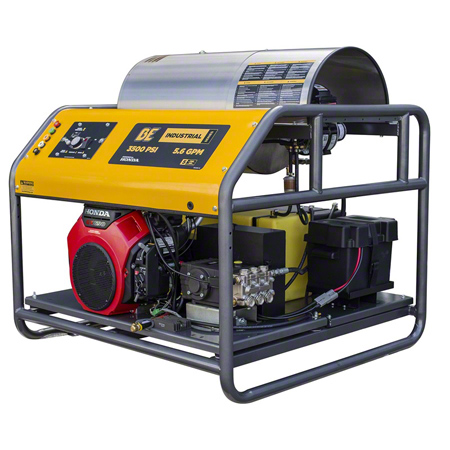Grease buildup, oily residue, and baked-on grime are everyday challenges in industrial cleaning. Cold water alone often isn’t enough, and relying solely on high pressure and harsh detergents can waste time and still fall short. That’s where the hot water pressure washer proves its value. For businesses that deal with tough messes regularly, it’s more than a machine—it’s a cleaning solution that saves time, labour, and long-term costs.
Real-World Scenarios Where Hot Water Wins
If your team is spending hours scrubbing down greasy shop floors or pressure washing equipment caked in mud and hydraulic fluid, you’ve likely already outgrown your cold water setup.
Here are a few common scenarios where hot water outperforms:
- Automotive and mechanical shops: Cutting through engine oil and grease buildup
- Food processing facilities: Meeting hygiene standards with fewer chemicals
- Farm and agriculture sites: Removing caked-on mud and animal waste from machinery
- Commercial fleets: Blasting off-road salt, fuel residue, and winter buildup
A hot water pressure washer combines temperature and pressure to dissolve contaminants more quickly and thoroughly—eliminating the need for extra passes or aggressive scrubbing.
Why Hot Water Cleans Better
It’s simple science: hot water breaks molecular bonds, making it easier to remove oil, grease, and stubborn grime. When combined with high-pressure spray, it becomes one of the most efficient cleaning tools in any industrial setting.
Not only does it reduce chemical use, but it also shortens drying time, helping facilities resume operations more quickly. Whether you’re using a Karcher pressure washer or another professional-grade brand, hot water adds speed and depth to every job.
Choosing the Right Hot Water Pressure Washer for Your Needs
When selecting a hot water system, consider your environment, cleaning needs, and available power source.
An electric hot water pressure washer is ideal for indoor or noise-sensitive areas. It produces no emissions, requires minimal maintenance, and operates efficiently in areas with reliable electrical access—such as warehouses, commercial kitchens, and enclosed loading bays.
On the other hand, fuel-powered models are better suited to remote job sites, construction areas, and agricultural zones where mobility and high PSI are essential.
Leading models like the Karcher pressure washer line offer both fuel and electric options, with features like:
- Adjustable pressure and temperature controls
- Integrated detergent tanks
- Robust heating systems
- Low-emission operation (especially in electric models)
Whichever type you choose, prioritize a model with durable components built to withstand industrial usage.
Know When It’s Time to Upgrade
If you’re constantly dealing with the same cleaning problems—or using too many chemicals to get results—it’s probably time to consider upgrading to a hot water unit.
Ask yourself:
- Are cleaning tasks taking longer than they should?
- Are oil and grease stains returning quickly?
- Are cold water units requiring multiple passes or extra labour?
If the answer is yes, a hot water pressure washer could reduce your cleaning time, improve sanitation, and lower overall cleaning costs.
Clean Smarter, Not Harder
Hot water units may have a higher upfront cost than cold water models. Still, they pay off through faster cycles, reduced chemical use, and better results—especially in demanding industrial settings. Whether you’re considering a Karcher pressure washer or a compact electric hot water pressure washer, the benefits speak for themselves.
Ready to upgrade your cleaning performance?Contact Roy Turk Industrial Sales Ltd for expert advice and access to high-performance pressure washers built for Canadian industries.

